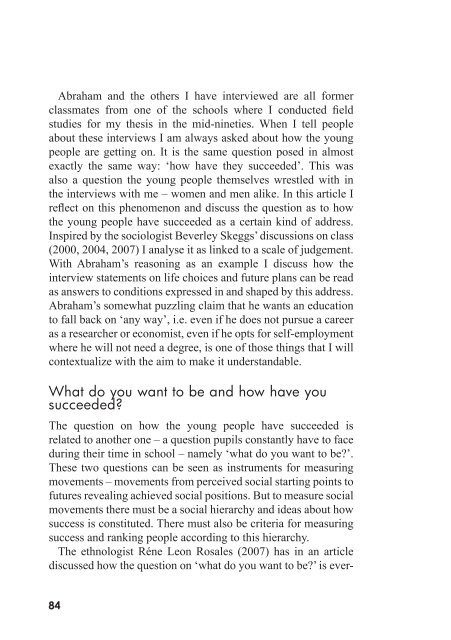Thinking with Bevereley Skeggs - Stockholms universitet
Thinking with Bevereley Skeggs - Stockholms universitet
Thinking with Bevereley Skeggs - Stockholms universitet
- No tags were found...
Create successful ePaper yourself
Turn your PDF publications into a flip-book with our unique Google optimized e-Paper software.
Abraham and the others I have interviewed are all formerclassmates from one of the schools where I conducted fieldstudies for my thesis in the mid-nineties. When I tell peopleabout these interviews I am always asked about how the youngpeople are getting on. It is the same question posed in almostexactly the same way: ‘how have they succeeded’. This wasalso a question the young people themselves wrestled <strong>with</strong> inthe interviews <strong>with</strong> me – women and men alike. In this article Ireflect on this phenomenon and discuss the question as to howthe young people have succeeded as a certain kind of address.Inspired by the sociologist Beverley <strong>Skeggs</strong>’ discussions on class(2000, 2004, 2007) I analyse it as linked to a scale of judgement.With Abraham’s reasoning as an example I discuss how theinterview statements on life choices and future plans can be readas answers to conditions expressed in and shaped by this address.Abraham’s somewhat puzzling claim that he wants an educationto fall back on ‘any way’, i.e. even if he does not pursue a careeras a researcher or economist, even if he opts for self-employmentwhere he will not need a degree, is one of those things that I willcontextualize <strong>with</strong> the aim to make it understandable.What do you want to be and how have yousucceeded?The question on how the young people have succeeded isrelated to another one – a question pupils constantly have to faceduring their time in school – namely ‘what do you want to be?’.These two questions can be seen as instruments for measuringmovements – movements from perceived social starting points tofutures revealing achieved social positions. But to measure socialmovements there must be a social hierarchy and ideas about howsuccess is constituted. There must also be criteria for measuringsuccess and ranking people according to this hierarchy.The ethnologist Réne Leon Rosales (2007) has in an articlediscussed how the question on ‘what do you want to be?’ is ever-84
















